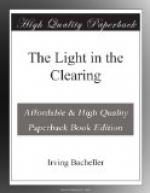I recall how, when the candles were lighted, storyteller, statesman, explorer, poet and preacher came from the far ends of the earth and poured their souls into ours. It was a dim light—that of the candles—but even to-day it shines through the long alley of these many years upon my pathway. I see now what I saw not then in the candle-light, a race marching out of darkness, ignorance and poverty with our little party in the caravan. Crowding on, they widened the narrow way of their stern religion.
At first we had only The Horse Farrier, The Cattle Book, The Story of the Indian Wars—a book which had been presented to Aunt Deel by her grandmother, and which in its shroud of white linen lay buried in her trunk most of the time for fear harm would come to it, as it did, indeed, when in a moment of generosity she had loaned it to me. The Bible and the St. Lawrence Republican were always with us.
Many a night, when a speech of Daniel Webster or Henry Clay or Dewitt Clinton had pushed me to the edge of unconsciousness, while I resisted by counting the steel links in the watch chain of Uncle Peabody—my rosary in every time of trouble—I had been bowled over the brink by some account of horse colic and its remedy, or of the proper treatment of hoof disease in sheep. I suffered keenly from the horse colic and like troubles and from the many hopes and perils of democracy in my childhood. I found the Bible, however, the most joyless book of all, Samson being, as I thought, the only man in it who amounted to much. A shadow lay across its pages which came, I think, from the awful solemnity of my aunt when she opened them. It reminded me of a dark rainy day made fearful by thunder and lightning. It was not the cheerful thing, illumined by the immortal faith of man which, since then, I have found it to be. The box of books changed the whole current of our lives.
I remember vividly that evening when we took out the books and tenderly felt their covers and read their titles. There were Cruikshanks’ Comic Almanac and Hood’s Comic Annual; tales by Washington Irving and James K. Paulding and Nathaniel Hawthorne and Miss Mitford and Miss Austin; the poems of John Milton and Felicia Hemans. Of the treasures in the box I have now; in my possession: A life of Washington, The Life and Writings of Doctor Duckworth, The Stolen Child, by “John Galt, Esq.”; Rosine Laval, by “Mr. Smith”; Sermons and Essays, by William Ellery Channing. We found in the box, also, thirty numbers of the United States Magazine and Democratic Review and sundry copies of the New York Mirror.
“Ayes! I declare! What do you think o’ this, Peabody Baynes!” Aunt Deel exclaimed as she sat turning the pages of a novel. “Ye know Aunt Minervy used to say that a novel was a fast horse on the road to perdition—ayes!”
“Well she wasn’t—” Uncle Peabody began and stopped suddenly. What he meant to say about her will never be definitely known. In half a moment he added:




